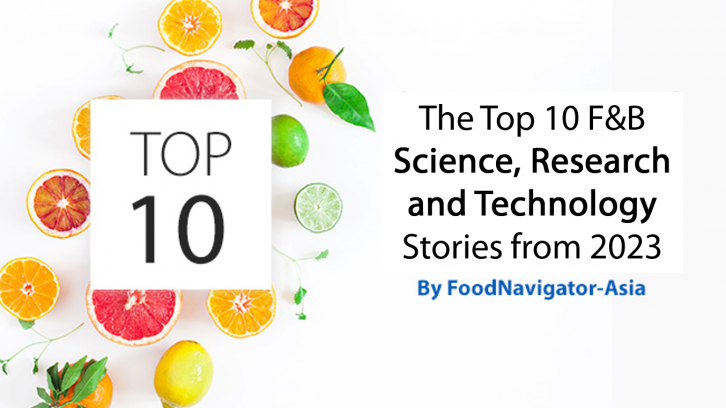Scientific spotlight: The Top 10 most read science, research and technology stories in 2023

Palm oil replacement ‘not the answer’: Nestle taps satellite tech for sustainability amid EU Deforestation Regulation debate
Nestle voiced support for the continued use of palm oil in the food and beverage sector earlier this year amid intense debate surrounding the recently-enacted EU Deforestation Regulation, while also striving to guarantee its supply chain sustainability using advance satellite technology.
The European Union (EU) parliament passed the highly controversial Deforestation Regulation (EUDR) on September 13 2022, which has been subject to intense and continuous scrutiny and protests ever since from many parties, particularly producer nations of commodities such as palm oil, coffee, cocoa and more.
The EUDR has been accused of many things from being a protectionist ploy to the potential catalyst of a new trade war between the EU and South East Asia, with Indonesia and Malaysia also having put aside their differences to present a joint front to the World Trade Organisation (WTO) in protest of it.
Too much sugar focus: ‘More measures’ needed for Singapore’s Nutri-Grade system to improve consumer diets – study
A study published earlier this year that was conducted by Singaporean researchers on the government’s Nutri-Grade front-of-package (FOP) beverage labelling scheme concluded that more work needs to be done for it to make a positive impact on consumer dietary and purchasing choices.
Singapore first announced the Nutri-Grade labelling scheme for sugar-sweetened pre-packaged beverages back in 2020, and this was finally officially enforced in the country in December 2022 after various delays attributed to COVID-19.
The scheme grades beverages from A (healthiest) to D (least healthy) in terms of sugar and saturated fat levels.
Saudi teen food trends: Study reveals ongoing shift towards fast food consumption
One in three Saudi Arabian youths were found to consume fast food more than twice a week, sparking concerns that the nation’s rapid economic development has been leading to dramatic shifts in eating habits.
Furthermore, around 85% of Saudi Arabian youths claimed to prefer fast foods to home-cooked food.
To assess the relationship between the frequency of fast-food consumption and dietary quality, a cross-sectional study was conducted based on data collected from 617 healthy adolescents aged between 11 and 18 years.
The students were randomly recruited from 16 schools in Madinah and Jeddah, Saudi Arabia, between October and November 2021.
Advancing agritech: Sustenir makes foray into precision agriculture with GABA gains
Singapore indoor vertical farming firm Sustenir has taken its first steps into precision agriculture by increasing levels of gamma-aminobutyric acid (GABA) in its kale.
Sustenir has built indoor vertical farming infrastructure using hydroponics technology and a controlled environment agriculture (CEA) system.
“The infrastructure allows us to ‘grow more with less’. We are able to grow a good quantity of fresh produce with less space and water, and without the use of pesticides, right in the heart of supercities,” Jack Moy, CEO of Sustenir Group, told FoodNavigator-Asia.
Plant-based challenges: Why ethics, environment and regulatory issues need to be addressed - new review
Researchers in China and the US published findings this year concluding that the plant-based sector would requires further scientific, technological and regulatory improvements in order to address consumer concerns and increase its commercial sustainability.
While the global commercialisation of meat substitutes is intended to counteract the environmental impact of the worldwide growth in meat consumption, it faces technological, consumer and regulatory challenges.
So far, research on meat substitutes has emphasised commercialisation, technological enhancements and lowering costs, with little attention paid to regulatory issues, ethical risk perception, environmental pollution and safety, states the paper.
Upgrading umami understanding: Ajinomoto lauds new Japanese study on amino acid potential to reduce consumer salt intake
Amino acid specialist firm Ajinomoto lauded the findings of a Japanese study published this year which highlighted the potential of umami ingredients, such as the various glutamate-based substances, to reduce consumer salt intake and improve public health.
The focus on sodium reduction has been of particular concern in Japan due to the nature of many local staple foods being highly dependent on salt for flavouring, from soy sauce to miso to processed meats and more.
The study, which was jointly undertaken by the University of Tokyo, Fukuoka Women’s University, Kagawa Nutrition University, the Tokyo Foundation for Policy Research as well as Ajinomoto, modelled the salt intake reduction via umami substances in 21,805 Japanese adults via data obtained from the National Health and Nutrition Survey.
Caffeine concerns: Oceania consumers’ inadequate understanding of beverage contents a risk
Data from Food Standards Australia New Zealand (FSANZ) published this year revealed lacking understanding in local consumers regarding caffeine content in daily foods and drinks and the relevant side effects, posing a risk of overconsumption.
Pursuant to FSANZ’s proposal to review permissions for caffeine in general foods and sports foods as well as risk assessments for sensitive sub-populations in late 2022, the agency conducted a systematic review covering 65 studies across 2010 to 2022 to examine consumer behaviour and understanding of caffeinated foods in the local food system, particularly the risks related to overconsumption.
According to the review, consumers are not always aware that a product contains caffeine especially when this is not made clear on the label, and many consumers have continued to consume more of such products even when experiencing caffeine-related side effects.
From tumour risk to microbiome harm: FAO and WHO debunk four cell-based meat misconceptions
The FAO and WHO released a report this year attempting to debunk four key misconceptions and concerns surrounding cell-based meat, spanning tumour risk to a negative impact on the microbiome.
The report which featured insights from regulators, researchers, and industry experts assessed the key food safety considerations of cell-based innovations and strategies to improve consumer understanding of the category.
Part of this involved commentating on several concerns that were garnering significant media attention:
“Given the attention they have received, these concerns have been considered by the Technical Panel, even if it was not possible to describe a sequence of events consistent with the current understanding of relevant science that could result in harm to consumers,” the report explained.
Age of Generative AI: Ai Palette aiming to optimise food innovation and boost product launches
Singapore-based tech firm Ai Palette developed a tool called FoodGPT this year, which harnesses the power of generative AI and natural language processing to elevate data-backed innovations and increase the success rate of product launches.
The beta version of FoodGPT was launched in mid-July, after three months of development.
“FoodGPT has been trained on a dataset comprising billions of consumer data points from 24 countries and across 16 different languages. By analysing data in native languages, FoodGPT ensures more precise and accurate answers to user queries. This is critical because F&B consumption is driven by local preferences,” Somsubhra Gan Choudhuri, co-founder and CEO of Ai Palette, told FoodNavigator-Asia.
Asia’s most ‘unfavourable markets’ for plant-based revealed as report highlights price and processing concerns
Price premiums, unsatisfactory taste, and a persistent perception of over-processed products were found to be the most common barriers to plant-based meat consumption in Asian markets.
This was according to a report from alt-protein think tank Food Frontier, which added that the most unfavourable markets for plant-based growth were Malaysia, Indonesia, Vietnam, Philippines, and India, despite being the world’s largest vegetarian population.
The dominance of traditional plant proteins, such as tempeh and tofu in Indonesia and dahl in Indonesia, and the higher prices of plant-based alternatives were key barriers for plant-based growth.















